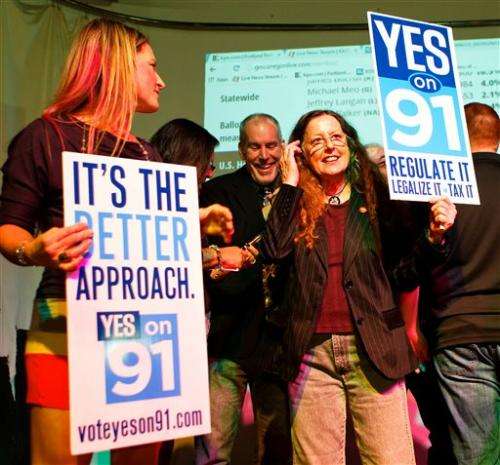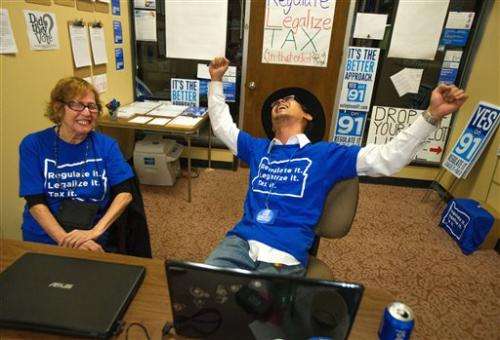Supporters for the legalization of marijuana celebrate at the Measure 91 party at Holocene night club in Portland, Ore., on Tuesday, Nov. 4, 2014. Oregon voters legalized recreational pot use Tuesday, making the state the third to approve the drug for commercial sales. (AP Photo/The Oregonian, Madeline Stone)
Marijuana activists who have longed for decades to end America's drug war celebrated more major victories Tuesday, with Oregon and the U.S. capital approving recreational pot use.
The advocates believed they also have another win, too, in Alaska, as a legal pot measure held a steady lead.
The only major loss for drug-law reformers came in Florida and even there, a medical marijuana proposal earned 58 percent—just shy of the 60 percent required to pass.
As Republicans swept to power in the Senate, the results emboldened marijuana activists as they prepare legalization efforts in California, Massachusetts, Maine and other states in the next presidential election year.
"We're starting work right now for 2016," said Joe Brezny, who's leading a campaign to legalize marijuana in Nevada. "The other side is in trouble if we're doing this well in a Republican midterm year."
Legalization opponent Kevin Sabet called the votes "a bit of a wake-up call before 2016," noting that drug policy groups had spent millions on the legalization campaigns, vastly outspending opponents.
Guam was poised to become the first U.S. territory to legalize medical marijuana, according to unofficial results that were expected to be certified Wednesday.
Matthew Yook, a field organizer for Measure 91, celebrates early returns that favor the Oregon Legalized Marijuana Initiative with Elvy Musikka, a medical marijuana recipient, at their downtown headquarters in Eugene, Ore., on Tuesday, Nov. 4, 2014. (AP Photo/The Register-Guard, Brian Davies)
The measures were among many that appeared on ballots, with voters approving ones to raise the minimum wage in four states, passing expanded gun background checks in Washington state and rejecting abortion-related measures in two states.
In California, drug war opponents welcomed a vote that reduces penalties, from felonies to misdemeanors, on possession of small amounts of drugs—including cocaine and heroin.
The marijuana votes were considered by many to be the first real test of marijuana reform's popularity since Washington state and Colorado passed the nation's first legal pot laws in 2012, boosted then by the higher turnout among young people typical of presidential election years.
Tuesday's vote saw voters in the Washington capital district make it legal to possess up to two ounces of pot and up to three mature marijuana plants for personal use, but it does not provide for the legal sale of marijuana. Congress, which has review power, could block the move.
Some voters in Alaska said marijuana was essentially legal in the state anyway, thanks to a 1975 state Supreme Court decision that possession of small amounts in the home is protected by citizens' right to privacy.
Advocates, opponents and the U.S. government have closely watched Washington and Colorado to gauge the impact on the black market, drug use among teens and impaired driving, among other areas.
Supporters celebrate the passage of Measure 91, legalizing marijuana in Portland, Ore., on Tuesday, Nov. 4, 2014, making the state the third to approve the drug for commercial sales. (AP Photo/The Oregonian, Michael Lloyd)
In both states, adults over 21 can purchase marijuana, including potent extracts and edibles, at state-licensed dispensaries.
Colorado allowed sales to begin at the start of the year, by letting its already-licensed medical dispensaries begin selling for recreational use. There have been some concerns over the strength of edibles sold, prompting plans for new rules there.
In Washington, where there is no regulated medical industry, legal marijuana's rollout has gone more slowly.
Colorado is on track to bring in about $84 million this year from medical and recreational pot taxes and fees. In Washington, where recreational pot sales began in July, the tax collections have totaled more than $7 million.
In other state ballot measures, voters in Alaska, Arkansas, Nebraska and South Dakota—all Republican-leaning states—approved increases in the state minimum wage at a time Republicans in Congress have blocked a national minimum wage increase.
In Washington state, voters approved a measure to expand background checks on gun sales and transfers.
© 2014 The Associated Press. All rights reserved.






















